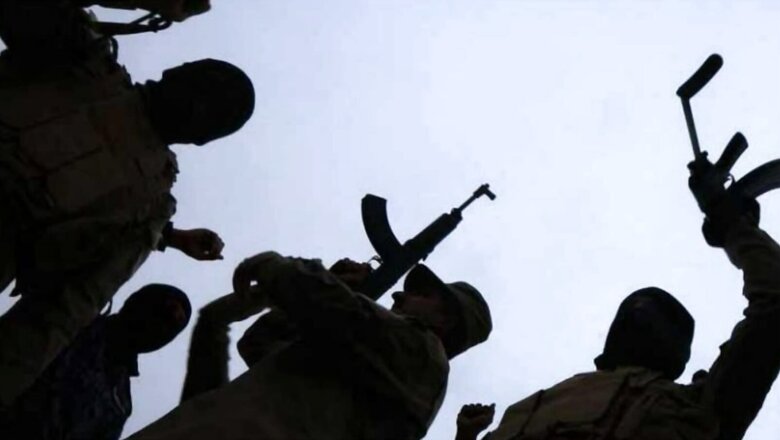
views
The Popular Front of India (PFI), which has allegedly been involved in a series of violent incidents and has “links” with global terror groups like ISIS, was late on Tuesday banned by the Centre along with its several associates for five years, following the second round of crackdown against its leaders. The organisations which were also declared banned under the stringent anti-terror law UAPA include Rehab India Foundation (RIF), Campus Front of India (CF), All India Imams Council (AIIC), National Confederation of Human Rights Organisation (NCHRO), National Women’s Front, Junior Front, Empower India Foundation and Rehab Foundation, Kerala.
“Whereas, the Central government, having regard to the above circumstances, is of the firm opinion that it is necessary to declare the PFI and its associates or affiliates or fronts association outlawed with immediate effect, and accordingly, in exercise of the powers conferred by the proviso to sub-section (3) of section 3 of the said Act, declares it as outlawed,” the home ministry said in a gazette notification.
While PFI has not been declared a terror outfit, News18 takes a look at banned terror organisations in India, according to the MHA:
• Babbar Khalsa International: The oldest and most organised Khalistan terrorist group, BKI continued to propagate the Khalistan ideology even after the terrorist-secessionist movement was comprehensively defeated in 1993. The BKI traces its origin to the Babbar Akali Movement of 1920 and is believed to have assumed its present form after the Baisakhi 1978 clashes between the Akhand Kirtani Jatha and Nirankaris and more particularly when some followers of Bibi Amarjit Kaur brought out some leaflets styling themselves as Babbar Khalsa after the killing of Nirankari chief Gurbachan Singh on April 24, 1980, explained the South Asia Terrorism Portal. While BKI reportedly operates in several countries, including Canada and the UK, it is most active in Pakistan under the ISI’s patronage.
• Khalistan Commando Force: Devinder Pal Singh Bhuller, a former Khalistan Commando Force militant, was given death penalty under TADA in 2001 by a Delhi court in connection with a 1993 car bomb attack in New Delhi in which 12 people were killed and 19 were injured. Backed by Pakistan, KCF also had plans to attack Adampur Air Force station in Punjab and recruit locals from villages along the Indo-Pakistan border to set up a terror network.
• Khalistan Zindabad Force: The Khalistan Zindabad Force, a proscribed group under The Unlawful Activities (Prevention) Act, 1967, aims to establish a ‘sovereign Khalistan state’. Although the exact cadre strength and organisational structure of the KZF is not known, it is largely comprised of Jammu-based Sikhs.
• International Sikh Youth Federation: Proscribed in India under the Prevention of Terrorism Act (POTA) on March 22, 2002, ISYF was founded in the United Kingdom in 1984 after the 1984 Operation Blue Star to flush out Sikh terrorists from the Golden Temple complex in Amritsar. Amrik Singh and Jasbir Singh Rode, nephew of Jarnail Singh Bhinderanwale, founded the ISYF.
• Lashkar-e-Taiba/Pasban-E-Ahle Hadis: Formed in 1990 in Afghanistan’s Kunar province, the Lashkar-e-Taiba is based in Muridke near Pakistan’s Lahore and headed by Hafiz Muhammad Saeed. Its first presence in Jammu and Kashmir (J&K) was recorded in 1993 when 12 Pakistani and Afghan mercenaries infiltrated across the Line of Control (LoC) in tandem with the Islami Inquilabi Mahaz, a terrorist outfit then active in the Poonch district of J&K. LeT has conducted numerous deadly attacks against Indian officials, troops, and civilians, with the most deadly being the 2002 attack on Gujarat’s Akshardam Temple, 2003 Mumbai blasts, 2005 Delhi bomb blasts, 2006 Mumbai blasts, and 26/11 Mumbai carnage among others.
• Jaish-E-Mohammed/Tahrik-E-Furqan: A Sunni extremist group based in Pakistan, JeM was founded by radical Islamist scholar Masood Azhar in 1994. Since its formation, it has claimed responsibility for multiple militant attacks, maintaining close relations with the Taliban and al-Qaeda in Afghanistan. It regularly targets government and security forces using arms attacks and suicide bombings and has been blamed for the 2001 Parliament attack.
• Harkat-Ul-Mujahideen/Harkat-Ul-Ansar/Harkat-Ul-Jehad-E-Islami: The Harkat-ul-Mujahideen (HuM), a Pakistan-based terrorist outfit, has been in existence twice in the history of that country’s involvement in cross-border terrorism. In the interim between the two phases, it continued to exist, but under the name of the Harkat-ul-Ansar (HuA). While the first renaming was an outcome of a reorganisation effected by the Inter-Services Intelligence (ISI), Pakistan’s external intelligence agency, among its various sponsored terrorist outfits in Jammu and Kashmir (J&K), the second renaming was necessitated by a US proscription of the outfit, the South Asia Terrorism Portal reported.
• Hizb-Ul-Mujahideen/ Hizb-Ul-Mujahideen Pir Panjal Regiment: The HM is one of the largest terror outfits currently operating in Jammu and Kashmir (J&K) and is proscribed under the Prevention of Terrorism Act, 2002. The Jamaat-e-Islami is reported to have set up the Hizb at the behest of the Inter Services Intelligence (ISI), Pakistan’s external intelligence agency, to counter the Jammu and Kashmir Liberation Front (JKLF), which had advocated complete independence of the State. Many of the early Hizb cadres were former JKLF members. The HM came into the spotlight when its ‘chief commander’ Abdul Majeed Dar made a conditional offer of ceasefire to the Indian government in Srinagar on July 24, 2000. This was endorsed by the group’s supremo Syed Salahuddin in an Islamabad press conference on July 25. However, Salahuddin soon withdrew his offer.
• Al-Umar-Mujahideen: Mushtaq Ahmad Zargar, one of the three terrorists released on December 31, 1999, by the Indian government in exchange for passengers of the hijacked aircraft IC 814 at Kandahar in Afghanistan, formed the Al-Umar-Mujahideen in December 1989, with a membership primarily drawn from recruits in downtown Srinagar. Zargar reportedly floated the AuM with the tacit endorsement of Srinagar-based cleric Maulvi Umar Farooq, after whom the outfit was named.
• Jammu and Kashmir Islamic Front
• United Liberation Front of Assam (ULFA): The government of India banned the United Liberation Front of Assam, also known as the United Liberation Front of Asom, in 1990 due to its separatist activities. Formed on April 7, 1979, by Bhimakanta Buragohain, Rajiv Rajkonwar alias Arabinda Rajkhowa, Golap Baruah alias Anup Chetia, Samiran Gogoi alias Pradip Gogoi, Bhadreshwar Gohain and Paresh Baruah, ULFA’s objective was to establish a “sovereign socialist Assam” through an armed struggle. The ULFA had clearly partitioned political and military wings. Paresh Barua headed the ‘military wing’ as the outfit’s ‘commander-in-chief’. Arabinda Rajkhowa was the head of the ‘political wing’.
• National Democratic Front of Bodoland (NDFB) in Assam: An armed separatist outfit that sought to obtain sovereign Bodoland for the Bodo people, NDFB was created in 1986. The group has conducted several attacks targeting non-Bodo civilians but is now in a ceasefire agreement with the government.
• People’s Liberation Army (PLA): The People’s Liberation Army (PLA) was established under the leadership of N Bisheswar Singh on September 25, 1978. The PLA aims to organise a revolutionary front covering the entire Northeast and unite all ethnic groups, including the Meiteis, Nagas and Kukis, to liberate Manipur. PLA, though a Meiti outfit, claims itself to be a trans-tribal organisation seeking to lead the non-Meiteis as well.
• United National Liberation Front (UNLF)
• People’s Revolutionary Party of Kangleipak (PREPAK)
• Kangleipak Communist Party (KCP)
• Kanglei Yaol Kanba Lup (KYKL)
• Manipur People’s Liberation Front (MPLF)
• All Tripura Tiger Force
• National Liberation Front of Tripura
• Liberation Tigers of Tamil Eelam (LTTE): The Liberation Tigers of Tamil Eelam (LTTE) were a militant separatist group fighting for an independent homeland for Hindu Tamils in Northeastern Sri Lanka. The LTTE was founded in the early 1970s by Velupillai Prabhakaran, who led the group until his death by Sri Lankan armed forces in May 2009. The group’s activities soon became a headache for India, especially after the assassination of former prime minister Rajiv Gandhi by a female suicide bomber in Sriperumbudur, Tamil Nadu. Though the group did not officially claim responsibility, its role was eventually established.
• Students Islamic Movement of India: An Islamist fundamentalist organisation, SIMI advocated the ‘liberation of India’ by converting it to an Islamic land. SIMI, an organisation of young extremist students declared ‘Jihad’ against India, seeking to establish Dar-ul-Islam (land of Islam) by either forcefully converting everyone to Islam or by violence. Several members of PFI are said to be former SIMI cadre.
• Deendar Anjuman: The Deendar Anjuman sect was formed by Hazrat Moulana Deendar Channabasaveshwara Siddiqui in 1924 in Bellampet in Karnataka’s Gulbarga district. According to the South Asia Terrorism Portal, the activities of the Sufi sect came into prominence in the aftermath of 13 bomb explosions at various places of worship across the states of Andhra Pradesh, Goa and Karnataka between May and July 2000 which were allegedly masterminded by Siddiqui’s son.
• Communist Party of India (Marxist-Leninist) — People’s War, all its formations and front organisations: The People’s War Group was formed in Andhra Pradesh on April 22, 1980, by Kondapalli Seetharamaiah, one of the most influential Naxalite leaders in the state and a member of the erstwhile Central Organising Committee of the Communist Party of India–Marxist-Leninist, (CPI-ML). Seetharamaiah was later expelled from the group. The PWG’s operations commenced in Karimnagar district, in the North Telengana region of Andhra Pradesh, and subsequently spread to other parts of the state as well as in other states.
• Maoist Communist Centre (MCC), all its formations and front organisations: The outfit came into existence, in its earlier version, on October 20, 1969, as Dakshin Desh. When the Communist Party of India (Marxist-Leninist) was formed with the merger of several Maoist groups in 1969, Dakshin Desh did not join and decided to retain its independent identity. In 1975, the outfit was renamed the Maoist Communist Centre (MCC). Like other Left-wing extremist groups, its objective was to establish a ‘people’s government’ through ‘people’s war’.
• Al Badr: Currently active in Jammu and Kashmir, Al Badr was formed in June 1998 to strengthen the ‘Kashmiri freedom struggle’ and merge J&K with Pakistan. Al Badr was proscribed by the government on April 1, 2002 and is also designated as a Foreign Terrorist Organization in the United States.
• Jamiat-ul-Mujahideen
• Al-Qaeda: Founded by Osama Bin Laden in the 1980s, al-Qaeda merged with several militant Islamist organisations to declare a ‘holy war’ against the United States. In 2001, 19 militants associated with al-Qaeda staged the September 11 attacks, one of the deadliest terror events on American soil in US history.
• Dukhtaran-E-Millat (DEM): An all-woman outfit, the Dukhtaran-e-Millat (DeM) uses extra-legal means, including threats, to impose its doctrines but has not taken to arms so far. The outfit, formed in 1987 has claimed that the Kashmir issue is primarily a religious issue and Jihad is mandatory.
• Tamil Nadu Liberation Army (TNLA): The origins of the TNLA can be traced to the activities of Pulavar Kaliyaperumal, a former school teacher and a Naxalite leader. The TNLA believes that independence of Tamil Nadu from ‘Indian rule’ is essential for the betterment of the people of Tamil Nadu and that armed struggle is necessary to achieve independence.
• Tamil National Retrieval Troops (TNRT)
• Akhil Bharat Nepali Ekta Samaj (ABNES)
• Organisations listed in the Schedule to the U.N. Prevention and Suppression of Terrorism (Implementation of Security Council Resolutions) Order, 2007 made under section 2 of the United Nations (Security Council) Act, 1947 and amended from time to time.
• Communist Party of India (Maoist), all its formations and front organisations
• Indian Mujahideen, all its formations and front organisations: According to Indian intelligence, the IM is not a well-knit organisation with a hierarchical structure like other more established groups. It is a loose network of Islamic organisations which includes the Students’ Islamic Movement of India (SIMI), certain individuals from the state of Uttar Pradesh with alleged links with the Harkat ul-Jihad-e-Islami (HuJI), and the terror cartel of Aftab Ansari.
• Garo National Liberation Army (GNLA), all its formations and front organisations
• Kamatapur Liberation Organization, all its formations and front organisations
• Islamic State/Islamic State of Iraq and Levant /Islamic State of Iraq and Syria/Daish, and all its manifestations: Islamic State in Iraq and the Levant (ISIL), also called Islamic State in Iraq and Syria (ISIS) and, since June 2014, the Islamic State, is a transnational Sunni insurgent group operating primarily in western Iraq and eastern Syria. First appearing under the name ISIL in April 2013, the group launched an offensive in early 2014 that drove Iraqi government forces out of key western cities, according to Britannica.
• National Socialist Council of Nagaland (Khaplang), NSCN (K), all its formations and front organisations
Read all the Latest Explainers News and Breaking News here




















Comments
0 comment